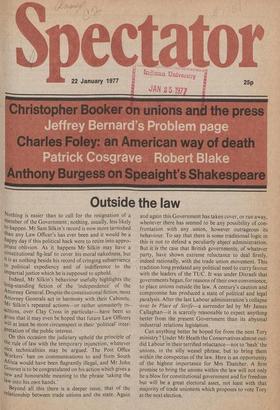Outside the law
Nothing is easier than to call for the resignation of' a Member of the Government ; nothing, usually, less likely to happen. Mr Sam Silkin's record is now more tarnished than any Law Officer's has ever been and it would be a happy day if this political hack were to retire into appropriate oblivion. As it happens Mr Silkin may have a Constitutional fig-leaf to cover his moral nakedness, but it is as nothing beside his record of cringing subservience to political expediency and of indifference to the impartial justice which he is supposed to uphold.
Indeed, Mr Silkin's behaviour usefully highlights the long-standing fiction of the 'independence' of the Attorney General. Despite the constitutional fiction, most Attorney Generals act in harmony with their Cabinets. Mr Silkin's repeated actions—or rather unmasterly in-, actions, over Clay Cross in particular— have been so gross that it may even be hoped that future Law Officers Will at least be more circumspect in their 'political' interpretation of the public interest.
On this occasion the judiciary upheld the principle of the rule of law with the temporary injunction, whatever °ice technicalities may be argued. The Post Office Workers' ban on communications to and from South Africa would have been flagrantly illegal, and Mr John Gouriet is to be congratulated on his action which gives a new and honourable meaning to the phrase 'taking the law into his own hands.'
Beyond all this there is a deeper issue, that of the relationship between trade unions and the state. Again and again this Government has taken cover, or run away, whenever there has seemed to be any possibility of confrontation with any union, however outrageous its behaviour. To say that there is some traditional logic in this is not to defend a peculiarly abject administration. But it is the case that British governments, of whatever party, have shown extreme reluctance to deal firmly, indeed rationally, with the trade union movement. This tradition long predated any political need to curry favour with the leaders of the TUC. It was under Disraeli that governments began, for reasons of their own convenience, to place unions outside the law. A century's caution and compromise has produced a state of political and legal paralysis. After the last Labour administration's collapse over In Place of Strife—a surrender led by Mr James Callaghan—it is scarcely reasonable to expect anything better from the present Government than its abysmal industrial relations legislation.
Can anything better be hoped for from the next Tory ministry ? Under Mr Heath the Conservatives almost outdid Labour in their terrified reluctance—not to 'bash' the unions, in the silly weasel phrase, but to bring them within the conspectus of the law. Here is an opportunity of the highest importance for Mrs Thatcher. A firm promise to bring the unions within the law will not only be a blow for constitutional government and for freedom but will be a great electoral asset, not least with that majority of trade unionists which proposes to vote Tory at the next election.


































